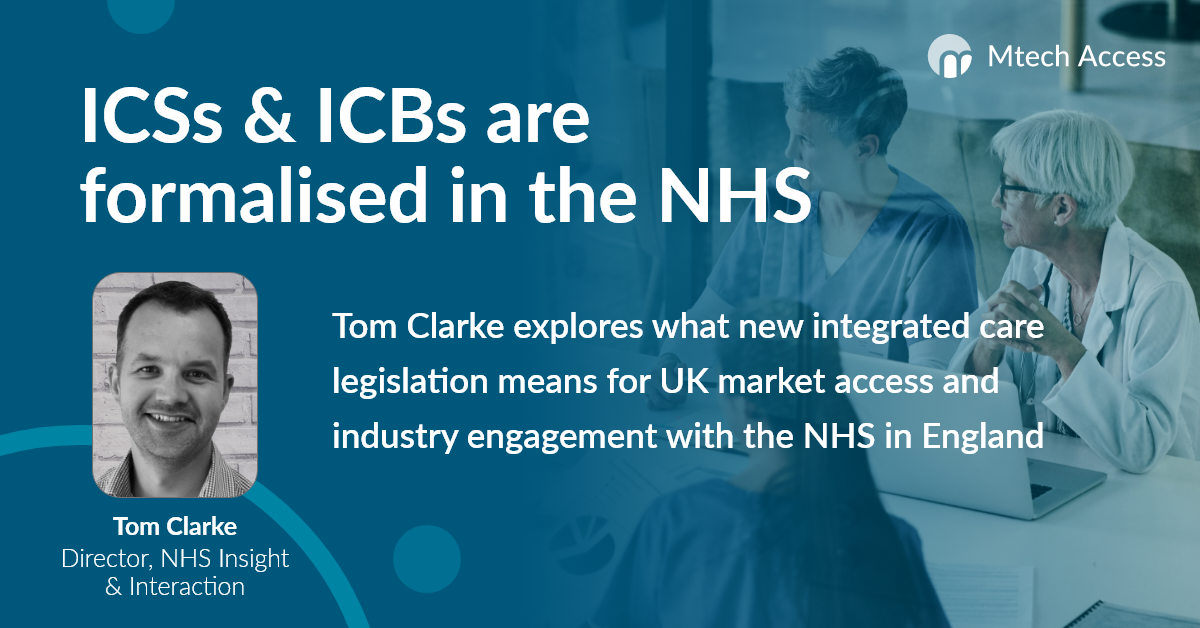
Tom Clarke (Director, NHS Insight & Interaction) explores what new integrated care legislation means for UK market access and for industry engagement with NHS decision-makers across England.
July 1st saw the formalisation through legislation of Integrated Care Systems (ICSs). This will in time allow greater autonomy for health and social care systems to make decisions about how to deliver care according to the needs of their own population.
The two most prominent impacts of the legislative change are the accountability of Integrated Care Boards (ICBs) and the delegation of budgetary responsibility to those ICBs. Progress is still to be made on both of those elements, and July 1st was certainly no triumphant dawn.
Integration will continue to be a slow and varied burn as systems are being driven far more by their own local circumstances and capabilities than their newfound legislative freedom.
The best way to understand the progress of ICSs is to get close to them locally. Conversations we have daily with leaders across the country highlight how varied they are and how they are setting themselves up for success.
Key areas of focus for ICSs
Although ambitions for single electronic records, integrated social care, and joined up patient-centric pathways are real, it is operational issues that loom large. During one of our regular catch ups with a panel of NHS Associates last week it was monkeypox, Covid and CIPs (Cost Improvement Programmes)s that were cited as consuming the most headspace.
There is limited appetite to engage around ‘product switches’ even where national guidance exists, except where the impact for a system budget cannot be ignored.
As ever, the drive to implement change is being frustrated by politics at both national and local level; blurred boundaries over accountability and big questions about how cornerstones of care will play out, such as:
- Will LES (local enhanced services) be maintained, and will they be consistent across ICSs?
- Is CQC being directed in a way that will influence the development of PCNs and provider collaboratives?
- What are the implications of prescribing and interventions of limited evidence being targets for large cost savings?
Industry engagement with ICSs
The message to industry regarding engagement with the NHS now is clear – “We want to work with you, we want you to come to us with ideas that will save us time and money, and we need you to make implementation of these ideas as simple as possible.”
The time that NHS leaders have to give to new initiatives is minimal, especially in areas where the prize is not huge.
In addition, product or condition-specific innovations are of less appeal than those that deliver broader benefits to a population, so be really clear about what you are offering and to whom.
We have observed a trend among our clients of becoming more aligned with the direction of travel but this needs to become business as usual rather than in pockets.
Look at the pathway not the product, and consider the relative rather than absolute size of your prize.
Planning for 2023
So, as you enter planning for 2023, the key things you need to consider are:
- Do you truly understand your place in the new NHS? Who will be paying for your innovation, and what matters to them? Have you mapped who matters in relation to your areas of interest?
- Are you equipped to support your customers in overcoming their challenges, and engage in open discussion about the place of your innovation in current and future pathways?
- Have you built capabilities internally to have conversations about population health, pathway development and system value?
- Do your offer and messaging clearly demonstrate how you will support the NHS’s broader objectives rather than just providing a product comparison? Can you articulate simply how your innovation aligns with the combined objectives of health & social care?
We will be covering all of these areas in our NHS Engagement Symposium in London on September 29th. It is intended to address all the key elements of brand and market access planning to fill any gaps you might have.
In the meantime, we’re always up for a conversation to see how we can help you overcome your challenges with our in-house NHS experts and network of NHS Associates. Even a small health check now on your thinking could have a significant impact on your success in 2023. Email info@mtechaccess.co.uk to arrange a conversation with our team.


